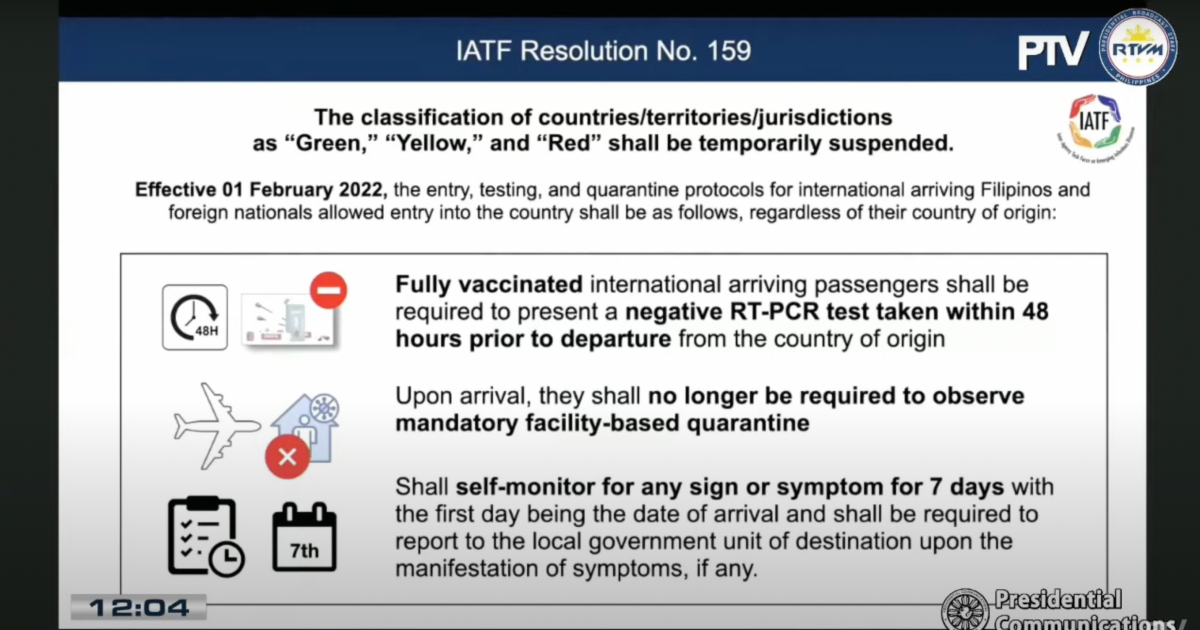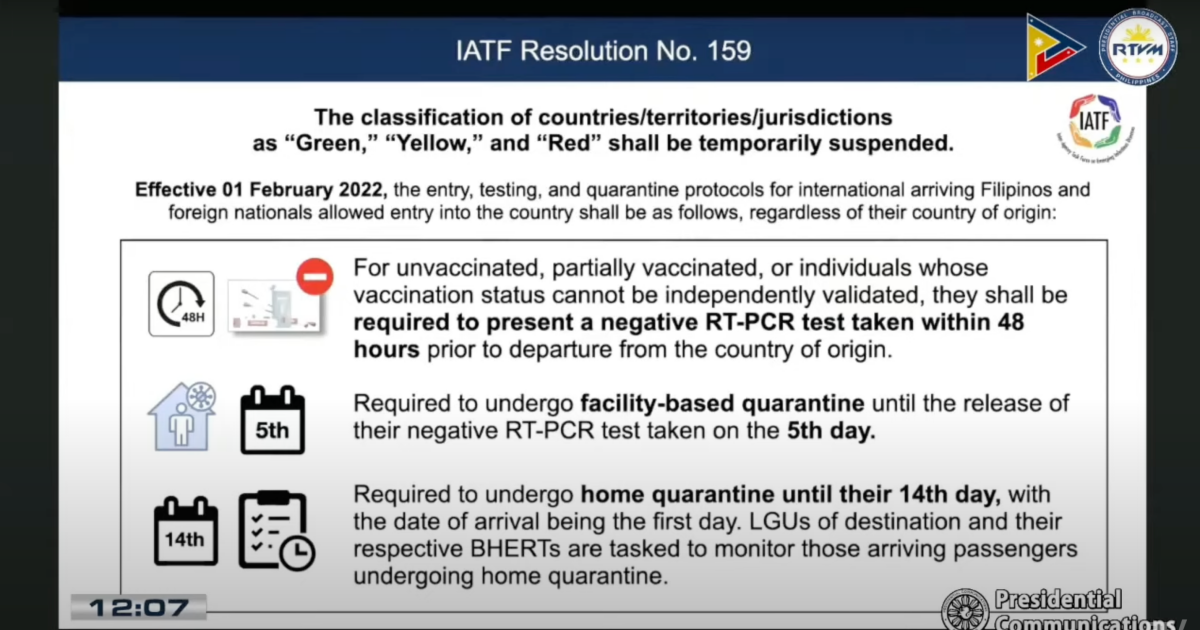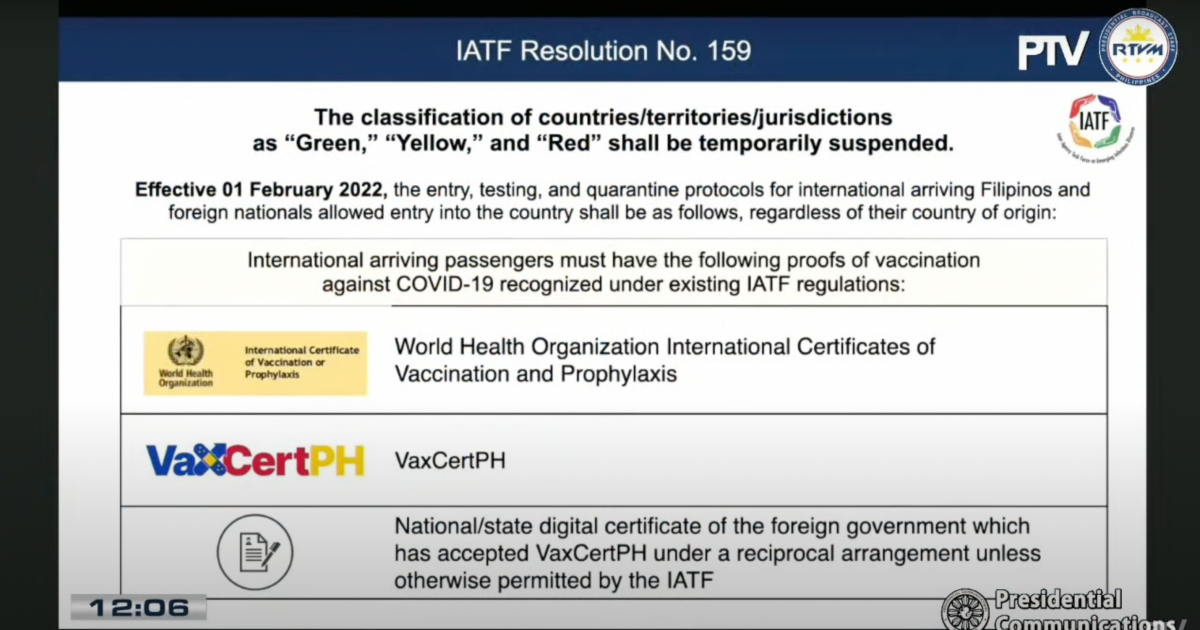PH removes facility-based quarantine requirement for fully vaxxed travelers; suspends risk classification
Starting Feb. 1, fully vaccinated returning overseas Filipinos (ROFs) and foreign nationals will no longer undergo mandatory facility-based quarantine, but must first test negative for COVID-19 and self-monitor for symptoms for a week, Malacañang announced on Jan. 28.
The Philippines will also temporarily suspend its green, yellow, and red COVID-19 risk classification next month, meaning that it won't matter whether a traveler would come from a country that's low-, moderate-, or high-risk for the virus.
In a presentation, acting palace spokesman Karlo Nograles said fully vaccinated international passengers must present a negative RT-PCR test taken within 48 hours prior to departure from the country of origin. Upon arrival, they must self-monitor for any sign or symptom for seven days, with the first day being the date of arrival.

Unvaccinated and partially vaccinated travelers, meanwhile, must not only submit a negative RT-PCR test result taken within 48 hours before departure but must also undergo facility-based quarantine.
Nograles said they'll be discharged after a negative test result on the fifth day. They must also complete the rest of their 14-day quarantine at home.
"Ito ay base sa mga rekomendasyon ng Task Force on COVID-19 New Variants at Sub-Technical Working Group on Data Analytics," Nograles said during a press briefing. "The travel risk classification is suspended unless we bring it back due to an emerging variant of concern."

As for children below 12 who cannot be vaccinated against COVID-19, Nograles said they shall follow the quarantine protocols of parents or accompanying guardians.
Asked why the Department of Health agreed to the new policy, its spokesperson Maria Rosario Vergeire said that the Philippine Genome Center's analysis showed that ROFs don't account for the bulk of the local cases, particularly the highly transmissible Omicron variant.
"Mababa po ang kaso ng ating mga returning overseas Filipinos, mababa ang incidence na nagpopositibo sila sa komunidad," Vergeire said in the same palace press briefing.
Vergeire also pointed out that it "doesn't make sense anymore" to impose facility-based quarantine among fully vaccinated individuals as community transmission is already high.
"Baka mas mataas pa doon sa mga pinagbabawalan naging countries," she said. "Dahil sa mga premise na iyan, ating nairekomenda na i-ease na ang restrictions."
Starting Feb. 10, Nograles also said that the Philippines will accept fully vaccinated nationals from non-visa required countries for business and tourism purposes.
They must hold passports valid for at least six months at the time of arrival, and has return or outbound tickets to their home countries or next country of destination.

They must also present the following:
- World Health Organization International Certificates of Vaccination and Prophylaxis;
- VaxCertPH;
- or, National/State digital certificates from foreign governments which also accept VaxCertPH in a reciprocal arrangement, unless otherwise permitted by the Inter-Agency Task Force on Emerging Infectious Diseases (IATF).
Unvaccinated foreign nationals, meanwhile, would no longer be allowed entry in the Philippines starting Feb. 16, according to Nograles.
"Makakabangon na po ang tourism industry at makaka-contribute ito ng malaki sa trabaho, kabuhayan, economic growth ng bansa," Nograles said, adding that 100% of tourism workers have already been fully vaccinated against COVID-19, citing data from the Department of Tourism.
The IATF on Jan. 14 allowed Filipino citizens from red list countries to return to the Philippines from Jan. 16 to Jan. 31, subject to quarantine protocols.


